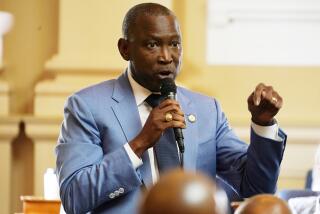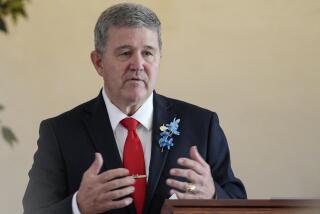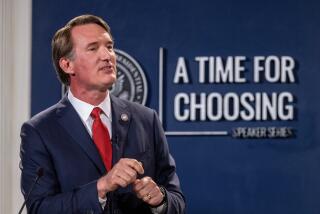First Elected Black Governor Takes His Oath
- Share via
RICHMOND, Va. — Lawrence Douglas Wilder, the grandson of slaves, stood here Saturday in the one-time capital of the Confederacy and took the oath of office as governor of Virginia--the first elected black governor in U.S. history.
Bracing against a bright winter chill, Wilder, 58, a Democrat and one-time Richmond lawyer who served a term as lieutenant governor before winning the state’s highest office last November, conceded during his inauguration speech that it was a moment to savor.
“Four years ago, I said to the people of Virginia that I was proud to be a Virginian,” he told the heavily black overflow crowd that had crammed into the courtyard of the state Capitol for the historic outdoor swearing-in ceremony. “That pride does burst forth (again), and lifts my voice and my spirit to proclaim, ‘I am a son of Virginia.’ ”
The installation of the nation’s first elected black governor was a particular point of pride to the blacks who had traveled here from all over the state--and the nation--to see Wilder take the oath. State Police estimated that 25,000 to 30,000 people jammed into the 2-block-long square.
“History is being made here in Richmond--of all places,” said Evelyn Walker, a 68-year-old retired schoolteacher and veteran of the civil rights era who brought her grandchildren to witness the inaugural ceremonies while sitting on the base of a statue of Confederate Gen. Thomas J. (Stonewall) Jackson.
Elliott A. White, 69, a black from Newport News, Va., one of the sections of the state that voted heavily for Wilder, agreed. “Twenty years ago, this just wouldn’t have been possible,” White told bystanders while the crowds were gathering for the ceremony. “This is really a breakthrough.”
Despite the initial chill, which gave way to a slight warming as the ceremony got under way at noon, the inauguration had a festive air. Thousands had to wait two hours or more in order to get a place on the Capitol grounds. Many spent the time bantering and chatting, often about the earlier days of the civil rights movement.
From time to time, spectators clapped to the music of an Army band. A 19-gun salute from ceremonial cannons startled some in the crowd at first, but left most of them beaming.
The inauguration had implications, however, that went beyond both the symbolism and the ceremony. Many analysts believe that Wilder’s campaign may have pointed the way to a new form of black politics--the shift by black politicians toward a more “mainstream” image designed to win white votes as well. His pro-choice stance on abortion also helped propel him to the top.
Wilder’s quiet, low-key approach contrasted sharply with the more flamboyant, and more ethnic-oriented, Rev. Jesse Jackson, whose image ultimately proved a liability when he was running against Massachusetts Gov. Michael S. Dukakis and several other candidates for the 1988 Democratic presidential nomination.
Wilder aides asked Jackson to stay away during last year’s campaign. On Saturday, the former presidential contender made an early morning appearance at an interdenominational prayer service that Wilder’s camp had organized, but he was not visible during the inauguration. Jackson praised Wilder’s election as “a great world story.”
During the election campaign, both Wilder and his opponent, moderate Republican J. Marshall Coleman, the state’s attorney general, took pains to avoid any outright reference to the race issue, although many had expected racially oriented rhetoric.
Even so, the campaign grew ugly in early autumn as both candidates attacked each others’ personal integrity over their stands on issues ranging from financial disclosure to their positions on the flag.
Wilder’s victory was so razor-thin that it prompted a re-count that was not fully resolved until a few weeks ago, when Wilder was declared the victor by just 6,741 votes out of more than 1.7 million cast.
The inaugural ceremonies Saturday came amid a weekend of lavish galas, receptions and network television appearances that together may have set a record for spending in Virginia’s relatively staid political environment.
Security was unusually tight, partly reflecting apprehension in the wake of the recent spate of bombings--linked to white supremacist groups--in several Southern states. But police said they had received no threats of violence, and the inauguration was free of any incidents.
Wilder was sworn in by former U.S. Supreme Court Justice Lewis F. Powell Jr. Also taking office were Lt. Gov. Donald S. Beyer Jr., a northern Virginia car dealer and political novice, and Atty. Gen. Mary Sue Terry, who won reelection last year. Both are Democrats.
Characteristically, the new governor passed up the opportunity to deliver a stem-winding speech. He avoided virtually any allusion to civil rights issues, pledging only to work to serve “all Virginians” and revived his talk of the “New Mainstream”--a theme that enabled him to win last November in a tradition-conscious Southern state whose electorate is 85% white. He also warned of possible economic problems ahead for the state.
Just after his inauguration, Wilder signed his first executive orders--one calling for “equal employment opportunity” in the state, and a second proclaiming the 1990s to be the decade of youth and family. “Hopefully, everything we do will reflect how we feel about it (youth and family),” he said.
On Monday, the birthday of slain civil rights leader Dr. Martin Luther King Jr., Wilder will deliver his first address to the state General Assembly, where he is expected to outline his legislative program for the year.
More to Read
Get the L.A. Times Politics newsletter
Deeply reported insights into legislation, politics and policy from Sacramento, Washington and beyond. In your inbox twice per week.
You may occasionally receive promotional content from the Los Angeles Times.










